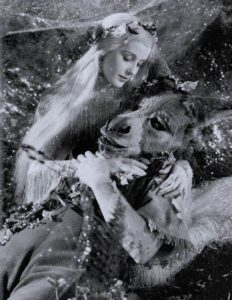
Dear Flynnstones,
when Errol renounced the role of Oberon, in Hollywood`s 1935 screen adaptation of “A Midsummer Night`s Dream”, not wanting to be known as “the king of the fairies”, he impacted many careers. Including his own. Instead of being Hamlet-bound, he, as we know, became the perennial pirate. Only a year later the movie world would see an aging Leslie Howard as a very mature Romeo alongside Norma Shearer`s Juliet. Not to be it was for our Hollywood hero.
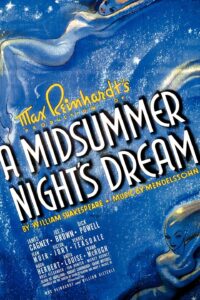
Austrian theatre impressario Max Reinhardt came to California with high hopes to find a new audience for his craft. He had been successfully staging plays from Vienna to Berlin at various venues. Up to this day his “Jedermann” (Everyman), the parable of a rich man reflecting his antics on the eve of his existence, is a fixture in Sound-of-Music Salzburg`s summer calender of its so called Festspiele festival.
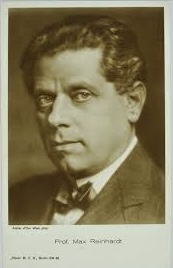
Despite and because his jewish ancestry Reinhardt, propaganda minister Goebbels, the goat of Babelsberg (where the Third Reich`s movie industry was located) pestered him to become an honoray aryan. Such was his value to Nazi Germany. But he decided to take his act elsewhere. Therefore later on his works were banned and his castle, Schloss Landskron, was dispossessed. With a three film contract by Warner Bros., he boarded an ocean liner and came to the USA with actress Helen Thimig, soon to become his second wife. Courtesy of Theatermuseum Vienna: Jack Warner`s wishing well card for a safe passage. Pre-war the Reinhardts travelled back and forth.
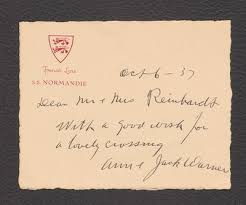
To his credit he brought Erich Wolfgang Korngold with him. First for a few weeks to arrange the “Midsummer”-musical score by Felix Mendelssohn Bartholdy. Weeks turned into months, years even and eventually earned Korngold two Academy Awards. Welcome to Sherhollywood, my lord!
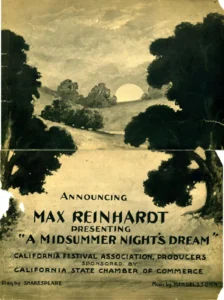
Max Reinhardt had staged the Shakespearean fever dream farce already in 1905, 1921, 1925, 1927 and 1930. In 1934 the Hollywood Bowl was chosen as site for the theatrical staging as a prelude to the film, filling its seats with 100.000 spectators watching some 400 artists performing on eight nights. 30.000 electric lights mimicking fireflies needed an seperate generator to produce the amount of the additional energy needed. The LA symphony orchester swelled up to the size of a big band. Call it raising to the occasion.
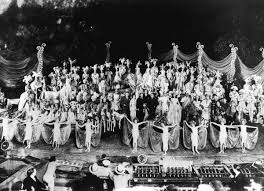
Two known flynnmates of the theatre ensemble of this event would go on to appear in the movie version. 18 year old Olivia DeHavilland who had been discovered by Professor Reinhardt while actually playing Hermia at Mills College. Mickey Rooney was engaged for the mischievous role of Robin Goodfellow for stage AND film at age 14. Puckish in life as on camera he broke a leg in a skiing accident, when filming already was on the way. Jack Warner was furious, he said he couldn`t decide whether to mend the injured leg or break the other one.
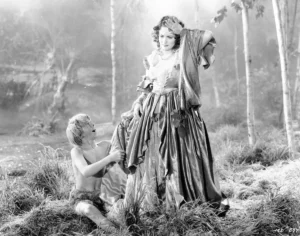
Initially M. Reinhardt fantasized an all star cast of the likes of Charlie Chaplin, Clark Gable, Cary Cooper, John Barrymore, Greta Garbo, Myrna Loy, Joan Crawford, W.C. Fields and Wallace Beery. He had to settle for James Cagney, Joe E. Brown (unforgettable for his famous last words “Nobody is perfect!” in Billy Wilder`s “Some like it hot”, arguably the best finishing line ever, not counting Stanley Kubrick`s “Eyes Wide Shut”), Ian Hunter, Dick Powell, Ross Alexander and Jane Muir.
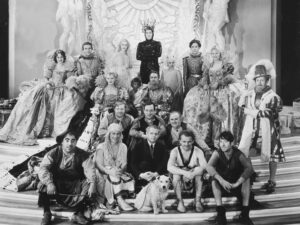
Lady Livvie`s stellar performance eventually cost Muir the female lead in “Captain Blood”. DeHavilland in turn profited from Gloria Stuart`s “falling ill” (she was pregnant at the time). Stuart originally cast as Hermia made good many decades later in the role of Rose in James Cameron`s “Titanic”. She also starred in “My Favorite Year”, where Peter O`Toole followed in Flynn`s tights. Speaking of ousting Errol- Victor Joy was praised highly for his poise and posture as the King of Fairies. EF`s Green Light co-star Anita Louise is very beautiful to look at as Oberon`s wife Titania.

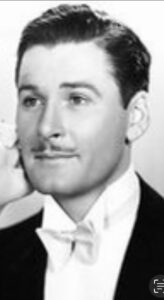
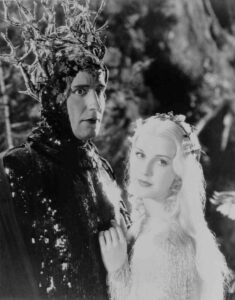
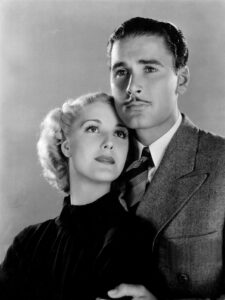
The play itself is one of the most liked and most used in theatre history. Shakespeare went far out, over the top and all in. Five plots are intertwined in five acts. The quadruple couple quagmire comes to a happy end, until then it is all fun and games in a twilight setting between dreaming and waking. Never mind there are undertones of a Tijuana donkey show, when Titania falls in love with Bottom, who was magically transformed overnight into a jackass.
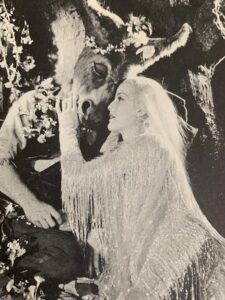
Here you see a cast-against-his-character-Cagney, who at that time was in the front runner for the lead in “The Adventures of Robin Hood”. Not the first man who made a complete ass of himself to achieve the affection of a fair female.
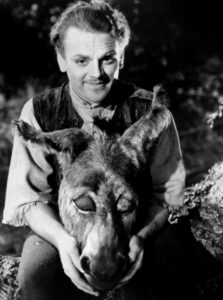
The film premiered simultanously in London, New York and Los Angeles on Oct. 9th 1935 and was attended by the you know whos of Hollywood. The anouncements of the likes of Marlene Dietrich, Mae West etc. took longer as the movie`s original running time of 132 minutes. It was trimmed to 117 minutes for general release. Catch a glimpse of the Flamitas, one of Tiger Lil and Errol`s earliest entries into the echelons of movie stardom in this featurette:
A Dream Comes True (1936 promo featurette for A MIDSUMMER NIGHT’s DREAM – KORNGOLD/Max Reinhardt (youtube.com…)
Enjoy,
— shangheinz
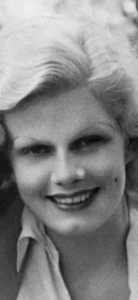
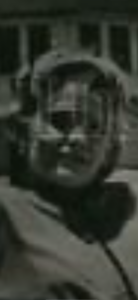
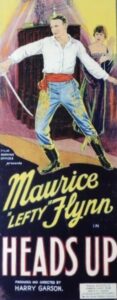
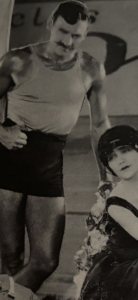
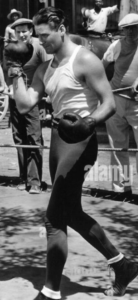
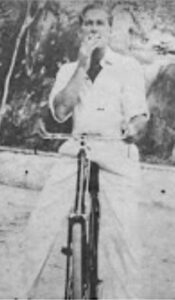
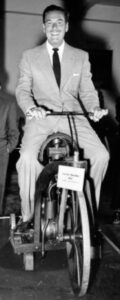
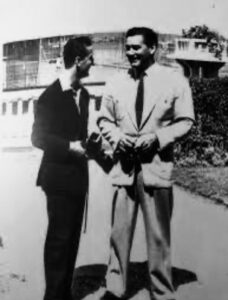
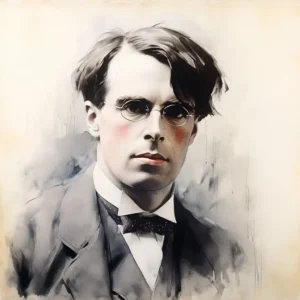
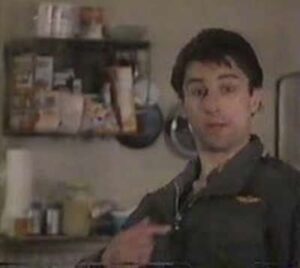














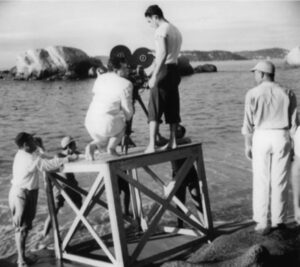
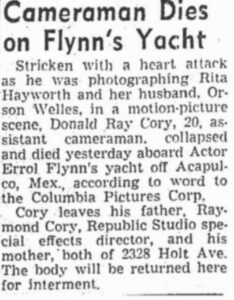
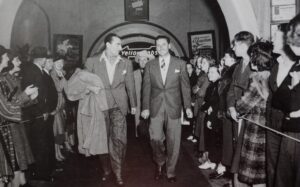
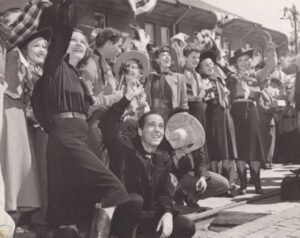
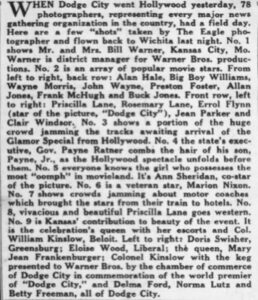
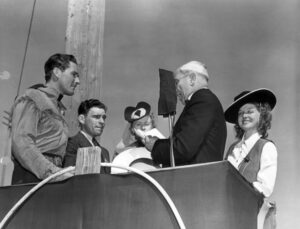
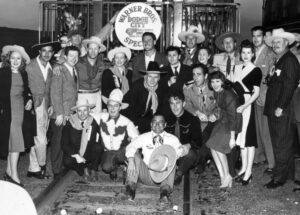 Enjoy,
Enjoy,